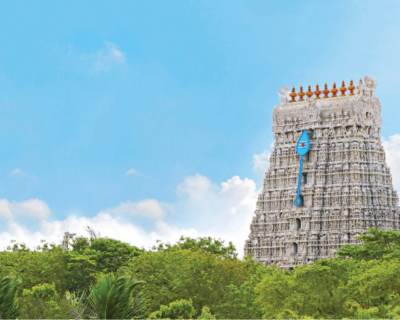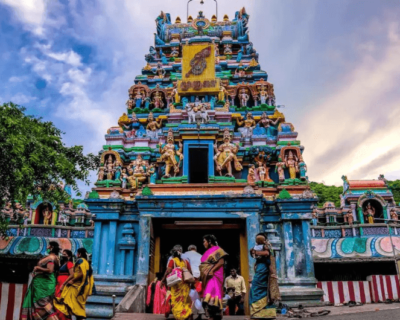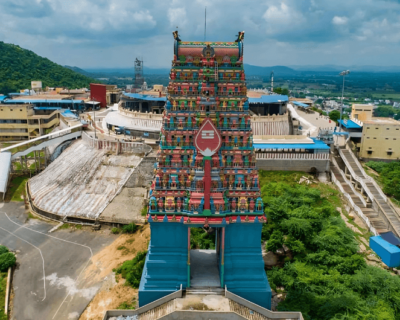Swamimalai Murugan Temple
Swamimalai, located near Kumbakonam in Tamil Nadu, is one of the most important temples dedicated to Lord Murugan, the son of Lord Shiva and Goddess Parvati. The name “Swamimalai” means “Hill of the Lord.”
This unique incident is what makes Swamimalai different from all other Murugan temples.
The temple is built on a small artificial hill with 60 steps, representing the 60 Tamil years. Devotees climb these steps to reach the main sanctum. The shrine is also architecturally special — the main deity is in a standing posture, with a peaceful and majestic look, and the pedestal resembles a Sivalinga, symbolizing unity between Murugan and Shiva.
Swamimalai Murugan Temple History
Thanjavur district, 6 km west of Kumbakonam is Swamimalai, Swaminathaswamy temple. Thiruthalam is the fourth of the six houses of Lord Muruga. It is the famous place where OM of Pranava Mantra was preached to his father Lord Shiva.According to Hindu mythology, this is the sacred place where Lord Murugan became the teacher of his own father, Lord Shiva. When Lord Brahma could not explain the meaning of the “Om” (Pranava) mantra, Murugan imprisoned him and later explained the mantra to Shiva himself. By doing so, Murugan took the role of a guru (teacher) and Lord Shiva became the disciple. Because of this, Lord Murugan here is also known as Swaminatha Swamy – meaning “The Lord who became a Guru to God.”
Mythological History
According to ancient stories, Swamimalai is the sacred place where Lord Murugan taught the meaning of the sacred “Om” mantra (Pranava Mantra) to his father, Lord Shiva. Because of this, during the ritual called Thiruneeru Abishegam (holy ash bath), Murugan is worshipped as Gnanaguru, which means the Teacher of Wisdom. During the sandalwood paste abishegam, he is known as Balasubramanian, representing his royal and graceful form.
The base (pedestal) on which Lord Murugan stands looks like a Sivalinga’s base (Avudaiyar), and the deity himself appears in the shape of a Sivalinga. This shows that Lord Shiva and Lord Murugan are one and the same in divine form.
Interestingly, besides the usual peacock, there is also a statue of an elephant in front of the Lord. As per the legends, Indra, the king of the gods, gave this elephant to Lord Murugan as a gift after he defeated the demon Harikesa.
THIRUMURUGATRUPADAI The sage Nakkheerar has composed a 317-lined poem Thirumurugaatrupadai in praise of six Murugan temples also known as arupadai veedu The fourth of the six temples is Thiruvaeragam, now known as Swamimalai. The poet praises the conduct of the Templeisaivars in this place and their rituals at the temple in the thirteen lines of his poem. The saint Arunagirinathar who lived in the 15th century has sung 16000 songs which have been grouped as Thiruppugazh, of which 38 songs are in praise of this temple.
Thiruezhukootrirukkai is a song composed on Swaminathaperuman by Arunagirinathar, also known as the spirit of Thiruppugazh. This is a picture poem where the verses are written in the form of a temple chariot. The poem is engraved in the granite stone and is placed in the temple premises. A renowned poet of yesteryears, KadukkanThyagarajaDhesikar has composed 9 songs in the name of ThiruYaeragaNavarathnamaalai.
Another poet named ThirisiraapuramSubbarayapillai has composed ThiruYaerageNaanmanimalai with 40 songs. This composition has all the forms of Tamil poetic literature like Kattalai, kalithurai, Venba, Viruththam and Agaval and is rich in vocabulary and meaning. The book ThiruYearagamagaAnthaathiwritted by KabisthalamVelaiyar, a Veerasaivite with 101 anthaathi-type songs, has been published by the ThiruvaaduthuraiAadheenam vide publication no.302 in the year 1978. VannasarbaThandapaniswamigal has composed Thanivenba in praise of the Thiruyaeraga Swaminathaperuman. All these compositions have been praiseworthy proof of the divinity of the Lord and his grace.
Temple Amenities
Marriage Hall
- Situated in the second precinct of Swamimalai temple, midway up the hill, surrounding the sanctum of Swaminathaswamy.
-
Suitable for small to medium gatherings.
-
Access via 60 temple steps to the hill shrine.
-
Booking required through the temple office.
Tonsure Facility
-
Available inside temple premises, typically near the base.
-
Token-based system — devotees purchase a small ticket to shave (usually ₹10–₹20).
Vehicle Parking
-
Limited official parking: The temple has no proper designated parking lot.
-
Street parking available nearby, typically along lanes around the temple.
-
Unofficial charges: Locals may collect ₹20–₹50 per car as an informal “parking fee”
Information Centre
-
No official HR&CE-run information centre available.
-
Volunteers and temple staff offer assistance near the parking area and entrance.
Swamimalai Murugan Temple Poojai
| Pooja Name | Pooja Timings |
| Viswaroopa Pooja (Nirmalya Alangaram) | 06:00 AM to 07:00 AM |
| Kalasandhi pooja (Thiruvabarana Alangaram) | 09:00 AM to 09:30 AM |
| Uchikkala Pooja (Thiruvabarana Alangaram) | 12:00 PM to 12:30 PM |
| Sayaraksha Pooja (Evening) (Thiruvabarana Alangaram) | 05:00 PM to 06:00 PM |
| Irandamkala Pooja (Sayarakasha Alangaram) | 07:00 PM to 07:30 PM |
| Ardhajama Pooja (Yegandha Alangaram) | 09:00 PM to 09:30 PM |
Swamimalai Murugan Temple Archanai & Other Fees
| Fees Description | Fees |
| The Golden Chariot Departure | 2000 |
| Moolavar Abishegam (Including all Pooja Things and offerings) | 3000 |
| Shanmugarcharnai (Including all pooja things and Offerings) | 6000 |
| Gold Kavasam | 2000 |
| KATTALAI ARCHANAI | 500 |
Swamimalai Murugan Temple 2025 Festivals
| Festival | Date 2025 | Significance¬es |
|---|---|---|
| Thai Poosam | February 11 | Kavadi processions, Vel puja, and special abhishekam in honour of Murugan’s divine spear. |
| Vaikasi Visakam | June 9 | Celebrates Murugan’s birthday with milk abhishekam, alankaram, and chariot procession |
| Chithirai Theerottam | May 3–14 | Eleven-day car (rathotsavam) festival with flag hoisting, various vahana processions and final Ther (chariot) |
| Skanda Sashti | June 1 | Six-day heroic festival culminating in Soorasamharam — Murugan’s victory over demon forces |
| Panguni Uthiram | March–April (full moon) | Murugan’s divine wedding ceremony with special ritual abhishekam and festivities |
| Karthigai Deepam | November – December | Festival of lights; oil lamps are lit throughout temple precincts in Murugan’s honor |
| Monthly Krithigai | Every Krithigai star | Special pujas held each month on the Krithigai nakshatra — auspicious for Murugan worship |






